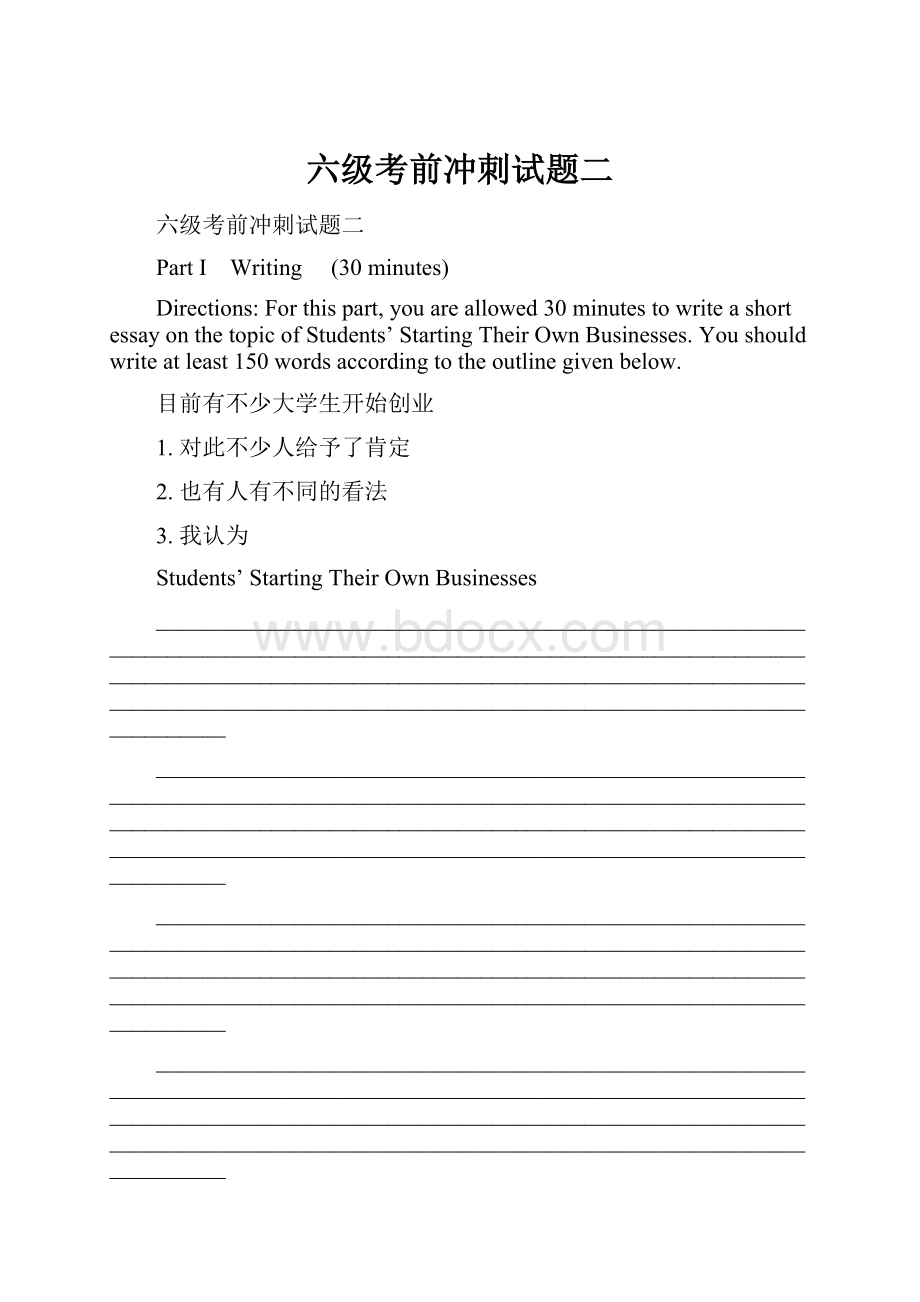六级考前冲刺试题二.docx
《六级考前冲刺试题二.docx》由会员分享,可在线阅读,更多相关《六级考前冲刺试题二.docx(20页珍藏版)》请在冰豆网上搜索。

六级考前冲刺试题二
六级考前冲刺试题二
PartIWriting(30minutes)
Directions:
Forthispart,youareallowed30minutestowriteashortessayonthetopicofStudents’StartingTheirOwnBusinesses.Youshouldwriteatleast150wordsaccordingtotheoutlinegivenbelow.
目前有不少大学生开始创业
1.对此不少人给予了肯定
2.也有人有不同的看法
3.我认为
Students’StartingTheirOwnBusinesses
______________________________________________________________________________________________________________________________________________________________________________________________________________________________________________________
______________________________________________________________________________________________________________________________________________________________________________________________________________________________________________________
______________________________________________________________________________________________________________________________________________________________________________________________________________________________________________________
______________________________________________________________________________________________________________________________________________________________________________________________________________________________________________________
______________________________________________________________________________________________________________________________________________________________________________________________________________________________________________________
PartIIReadingComprehension(SkimmingandScanning)(15minutes)
Directions:
Inthispart,youwillhave15minutestogooverthepassagequicklyandanswerthequestionsonAnswerSheet1.Forquestions1-7,choosethebestanswerfromthefourchoicesmarkedA),B),C)andD).Forquestions8-10,completethesentenceswiththeinformationgiveninthepassage.
Choiceblindness:
Youdon’tknowwhatyouwant
Wehaveallheardofexpertswhofailbasictestsofsensorydiscriminationintheirownfield:
winesnobs(自命不凡的人)whocan’ttellredfromwhitewine(thoughinblackenedcups),orartcriticswhoseedeepmeaninginrandomlinesdrawnbyacomputer.Wedelightinsuchstoriessinceanyoneclaimingtobeanauthorityisfairgame.Butwhatifweshinethespotlightonchoiceswemakeabouteverydaythings?
Expertsmightbeforgivenforbeingwrongaboutthelimitsoftheirskillsasexperts,butcouldwebeforgivenforbeingwrongaboutthelimitsofourskillsasexpertsonourselves?
Wehavebeentryingtoanswerthisquestionusingtechniquesfrommagicperformances.Ratherthanplayingtrickswithalternativespresentedtoparticipants,wesecretlyalteredtheoutcomesoftheirchoices,andrecordedhowtheyreact.Forexample,inanearlystudyweshowedourvolunteerspairsofpicturesoffacesandaskedthemtochoosethemostattractive.Insometrials,immediatelyaftertheymadetheirchoice,weaskedpeopletoexplainthereasonsbehindtheirchoices.
Unknowntothem,wesometimesusedadouble-cardmagictricktosecretlyexchangeonefacefortheothersotheyendedupwiththefacetheydidnotchoose.Commonsensedictatesthatallofuswouldnoticesuchabigchangeintheoutcomeofachoice.Buttheresultshowedthatin75percentofthetrialsourparticipantswereblindtothemismatch,evenoffering“reasons”fortheir“choice”.
Wecalledthiseffect“choiceblindness”,echoingchangeblindness,thephenomenonidentifiedbypsychologistswherearemarkablylargenumberofpeoplefailtospotamajorchangeintheirenvironment.RecallthefamousexperimentswhereXasksYfordirections;whileYisstrugglingtohelp,XisswitchedforZ—andYfailstonotice.Researchersarestillponderingthefullimplications,butitdoesshowhowlittleinformationweuseindailylife,andunderminestheideathatweknowwhatisgoingonaroundus.
Whenwesetout,weaimedtoweighinontheenduring,complicateddebateaboutself-knowledgeandintentionality.Foralltheintimatefamiliaritywefeelwehavewithdecision-making,itisverydifficulttoknowaboutitfromthe“inside”:
oneofthegreatbarriersforscientificresearchisthenatureofsubjectivity.
Asanyonewhohaseverbeeninaverbaldisagreementcanprove,peopletendtogiveelaboratejustificationsfortheirdecisions,whichwehaveeveryreasontobelievearenothingmorethanrationalisations(文过饰非)aftertheevent.Toprovesuchpeoplewrong,though,orevenprovideenoughevidencetochangetheirmind,isanentirelydifferentmatter:
whoareyoutosaywhatmyreasonsare?
Butwithchoiceblindnesswedrivealargewedgebetweenintentionsandactionsinthemind.Asourparticipantsgiveusverbalexplanationsaboutchoicestheynevermade,wecanshowthembeyonddoubt—andproveit—thatwhattheysaycannotbetrue.Soourexperimentsofferauniquewindowintoconfabulation(虚构)(thestory-tellingwedotojustifythingsafterthefact)thatisotherwiseverydifficulttocomeby.Wecancompareeverydayexplanationswiththoseunderlabconditions,lookingforsuchthingsastheamountofdetailindescriptions,howcoherentthenarrativeis,theemotionaltone,oreventhetimingorflowofthespeech.Thenwecancreateatheoreticalframeworktoanalyseanykindofexchange.
Thisframeworkcouldprovideaclinicaluseforchoiceblindness:
forexample,twoofourongoingstudiesexaminehowmalingering(装病)mightdevelopintotruesymptoms,andhowconfabulationmightplayaroleinobsessive-compulsivedisorder(强迫症).
Importantly,theeffectsofchoiceblindnessgobeyondsnapjudgments.Dependingonwhatourvolunteerssayinresponsetothemismatchedoutcomesofchoices(whethertheygiveshortorlongexplanations,givenumericalratingorlabelling,andsoon)wefoundthisinteractioncouldchangetheirfuturepreferencestotheextentthattheycometopreferthepreviouslyrejectedalternative.Thisgivesusarareglimpseintothecomplicateddynamicsofself-feedback(“Ichosethis,Ipubliclysaidso,thereforeImustlikeit”),whichwesuspectliesbehindtheformationofmanyeverydaypreferences.
Wealsowanttoexploretheboundariesofchoiceblindness.Ofcourse,itwillbelimitedbychoicesweknowtobeofgreatimportanceineverydaylife.Whichbrideorbridegroomwouldfailtonoticeifsomeoneswitchedtheirpartneratthealtarthroughamazingsleightofhand(巧妙的手段)?
Yetthereisampleterritorybetweentheabsurdideaofspouse-swapping,andtheresultsofourearlyfaceexperiments.
Forexample,inonerecentstudyweinvitedsupermarketcustomerstochoosebetweentwopairedvarietiesofjamandtea.Inordertoswitcheachparticipant’schoicewithoutthemnoticing,wecreatedtwosetsof“magical”jars,withlidsatbothendsandadividerinside.Thejarslookednormal,butweredesignedtoholdonevarietyofjamorteaateachend,andcouldeasilybeflippedover.
Immediatelyaftertheparticipantschose,weaskedthemtotastetheirchoiceagainandtellusverballywhytheymadethatchoice.Beforetheydid,weturnedoverthesamplecontainers,sothetastersweregiventheoppositeofwhattheyhadintendedintheirselection.Strikingly,peopledetectednomorethanathirdofallthesetricktrials.Evenwhenweswitchedsuchremarkablydifferentflavorsasspicycinnamonandappleforbittergrapefruitjam,theparticipantsspottedlessthanhalfofallswitches.
Wehavealsodocumentedthiskindofeffectwhenwesimulateonlineshoppingforconsumerproductssuchaslaptopsorcellphones,andevenapartments.Ourlatesttestsareexploringmoralandpoliticaldecisions,adomainwherereflectionanddeliberationaresupposedtoplayacentralrole,butwhichwebelieveisperfectlysuitedtoinvestigatingusingchoiceblindness.
Throughoutourexperiments,aswellasregisteringwhetherourvolunteersnoticedthattheyhadbeenpresentedwiththealternativetheydidnotchoose,wealsoquizzedthemabouttheirbeliefsabouttheirdecisionprocesses.Howdidtheythinktheywouldfeeliftheyhadbeenexposedtoastudylikeours?
Didtheythinktheywouldhavenoticedtheswitches?
Consistently,between80and90percentofpeoplesaidthattheybelievedtheywouldhavenoticedsomethingwaswrong.
Imaginetheirsurprise,evendisbelief,whenwetoldthemaboutthenatureoftheexperiments.Ineverydaydecision-makingwedoseeourselvesasknowingalotaboutourselves,butlikethewinebufforartcritic,weoftenoverstatewhatweknow.Thegoodnewsisthatthisformofdecisionsnobberyshouldnotbetoodifficulttotreat.Indeed,afterreadingthisarticleyoumightalreadybecured.
1.Whatdoestheauthorsayaboutsomeexperts?
A)Theyareauthoritiesonlyintheirownfields.
B)Theyaren’teasilyfooledbythetrickytests.
C)Themistakesthey’vemadeareinevitable.
D)Theysometimesfailtodowellasclaimed.
2.Whatdidtheresearchersdotoparticipantsintheexperiments?
A)Theyputonamagicperformancetotheparticipants.
B)Theydivertedtheparticipants’attentionanddisruptedtheirchoosing.
C)Theychangedthethingsparticipantschosewithouttheirnoticing.
D)Theyaddedconfusiontothetwooptionstheparticipantsfaced.
3.Whatdoestheresultofthefacechoosingexperimentsreveal?
A)Peoplecouldexplainwellwhytheymadetheirchoices.
B)Onlyafewofparticipantshadchoiceblindnessinmakingdecision.
C)Usuallyparticipantswereawareofthelimitsoftheirskills.
D)Mostparticipantsdidn’trealizethattheirchoiceshadbeenswitched.
4.Changeblindnessreferstothephenomenonthat________.
A)manypeoplefailtonoticethebigchangearoundthem
B)peopletendtoignorethesmallchang